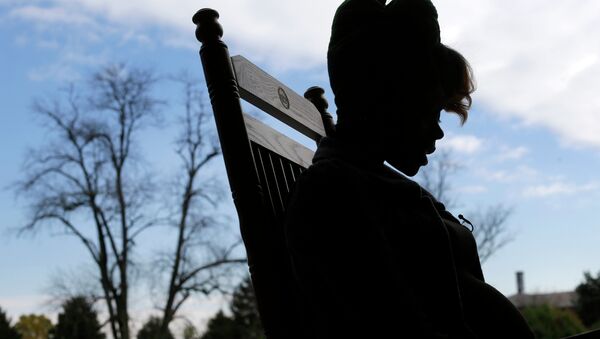Child exploitation cases shot up by 66 percent in 2017 following an increase in the use of so-called county lines by organized criminal gangs; these children are often threatened with guns and violence and forced to run drugs and money between big cities and small rural towns along county lines, according to new data published by the National Crime Agency (NCA).
The NCA recently published an update on the drug dealing model known as county lines, revealing, "dealers will usually use a single phone line to facilitate the supply of class A drugs — primarily heroin and crack cocaine — to customers. The county line becomes a recognized and valuable brand and is therefore protected with violence and intimidation.
Today, we publish the National Referral Mechanism Statistics — End of Year Summary 2017
— NationalCrimeAgency (@NCA_UK) March 26, 2018
This report presents a summary of the number of potential victims of modern slavery and human trafficking referred in the NRM in 2017
You can find it here: https://t.co/ca1rRR5x5x pic.twitter.com/kdMBKn2bfF
READ MORE: Kids With 'Clean Skin's: How UK Rural Areas Get Exploited by Drug Lords
The rise in reports of children linked to cases of modern slavery in Britain — from 1278 in 2016 to 2118 in 2017 — is also due to an increase in the number of unaccompanied asylum seeking children being referred to the National Referral Mechanism (NRM). The NRM was introduced in 2009 as a framework to identify and collect data about potential victims of human trafficking or modern slavery in Britain.
READ MORE: Child Drug Runners Exploited by London Gangs to Deal in Rural Areas
The grooming and exploitation of young people by #CountyLines drug gangs has contributed to a 66% increase in minor exploitation referrals in 2017 compared to 2016. Over 5000 potential victims were submitted to the National Referral Mechanism.https://t.co/OdK4YZkRTo pic.twitter.com/2hLIUagqDA
— Substance Misuse (@leicsSMO) March 26, 2018
"Evolving Threat"
There were 5145 potential victims of modern slavery in Britain in 2017, the total number of cases rising by 35 percent, the majority of victims of human trafficking are from Albania, Vietnam and the UK itself; the majority of men, women and children are exploited for their labor and forced into a life of crime, according to the NRM's recent report.
British nationals highest number of #ModernSlavery victims in UK for the first time – more than double number of Brits referred in 2016. https://t.co/4uz4B8IMC7
— Kevin Hyland OBE (@UKAntiSlavery) March 27, 2018
"What this report reinforces is that we are now dealing with an evolving threat," NCA director Will Kerr said in a statement. "Particularly concerning to us in the rise in young people being exploited for sexual purposes or drug trafficking," Kerr says.
The report is a summary of potential victims of modern slavery and human trafficking in the UK — and stipulates it "does not provide any analysis of the picture of modern slavery in the UK," which suggests the number of victims is higher — but remains a hidden issue.
Modern Slavery: Is it happening next door to you? You may live next door to a construction worker, a nail bar technician, factory worker or cleaner. But your neighbour may be a victim of #modernslavery https://t.co/qogiHhwEsV pic.twitter.com/15EQibXhOj
— GLAA (@UK_Glaa) March 19, 2018
"Ruthless Predators"
The Minister for Crime, Safeguarding and Vulnerability, Victoria Atkins said in a statement: "Modern slavery and trafficking are despicable crimes which see some of the most vulnerable people in society targeted by ruthless predators. These figures show that more potential victims are being identified and protected thanks to a greater awareness and improved understanding of modern slavery," Atkins says.
Changes to the NRM mean that victims of human trafficking will receive support for 90 days, extending the 'move-on' support from 14 days to 45 days, plus the additional minimum 45 days of support victims already receive.
READ MORE: Pregnant Victims of Modern Slavery Left 'Isolated' in London — Charity
The only type of exploitation that hasn't increased in organ harvesting, where there were three cases in 2017; labor exploitation, sexual exploitation and child labour exploitation remain the top three biggest drivers of modern slavery in Britain.


